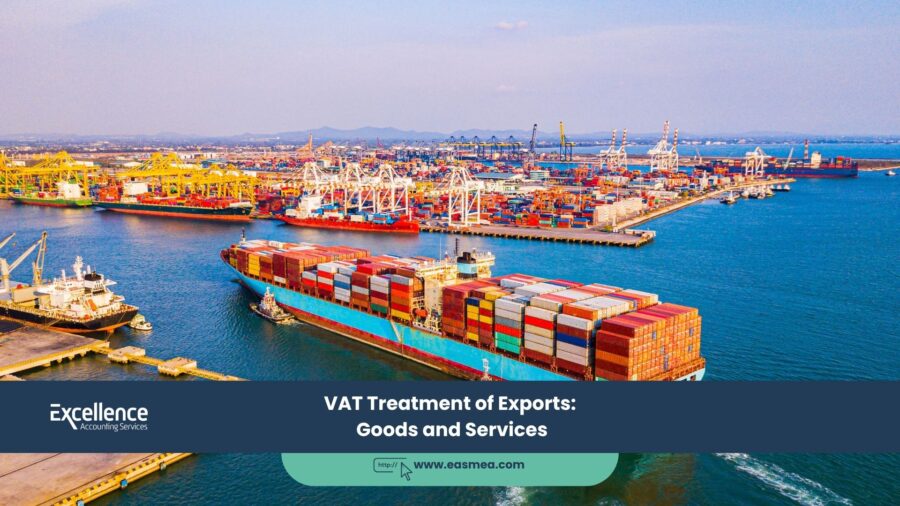A Comprehensive Guide to the VAT Treatment of Exports: Goods and Services
The UAE’s position as a global trade hub makes exporting a core activity for countless businesses. Under the UAE VAT Law, exports are given a special status: they are treated as **zero-rated supplies**. This favorable treatment is designed to ensure that UAE businesses remain competitive in the global marketplace by not burdening their international customers with a domestic tax. However, this 0% VAT rate is not automatic. It is a privilege that comes with strict conditions and documentation requirements set by the Federal Tax Authority (FTA).
- A Comprehensive Guide to the VAT Treatment of Exports: Goods and Services
- The Golden Rule: Why "Zero-Rated" is Better Than "Exempt"
- VAT on the Export of Goods
- VAT on the Export of Services
- How Excellence Accounting Services (EAS) Ensures Export Compliance
- Frequently Asked Questions (FAQs)
- Are Your Export Files Audit-Proof?
Applying a zero rate to an export without meeting the specific criteria is a serious compliance error that can lead to significant penalties. The rules for exporting goods are different from those for exporting services, and businesses must understand the nuances of both. The burden of proof always lies with the exporter to demonstrate that a supply qualifies for the zero rate.
This guide provides a detailed examination of the VAT treatment for both the export of goods and the export of services from the UAE. We will break down the specific conditions that must be met for each, highlight the critical documentary evidence required, and discuss common pitfalls. With expert insight from our VAT consultants, this article will serve as a vital resource for any UAE business engaged in international trade.
Key Takeaways
- Exports are Zero-Rated, Not Exempt: This is a crucial distinction. As a zero-rated supplier, you charge 0% VAT to your overseas customer but can still recover the VAT you paid on your related business costs (input tax).
- Strict Conditions Apply: The zero rate is conditional. For goods, you must prove they physically left the UAE. For services, you must prove the recipient is outside the UAE and the service is consumed outside the UAE.
- Documentation is Everything: The burden of proof is on you. Without the correct official and commercial evidence (e.g., exit certificates, bills of lading, contracts), the FTA may deem the supply standard-rated at 5%.
- Goods vs. Services Rules Differ: The criteria for zero-rating services are often more complex than for goods, focusing on the location of the recipient and the place of consumption.
- Time Limits are Crucial: For goods, the export must generally take place within 90 days of the date of supply.
The Golden Rule: Why “Zero-Rated” is Better Than “Exempt”
Before diving into the specifics, it’s vital to re-emphasize the difference between zero-rated and exempt supplies. While both mean the end customer is not charged VAT, their impact on your business is vastly different. If exports were exempt, you would not be able to recover the VAT on your business expenses related to those exports (like shipping, marketing, or raw materials). This “sticky tax” would become a direct cost, forcing you to either reduce your profit margins or increase your prices.
By making exports **zero-rated**, the government allows you to remain in the VAT system. You file a VAT return, report your 0% sales, and claim a refund for the 5% VAT you incurred on your costs. This keeps your business competitive and free from embedded tax costs.
Treating an export as zero-rated is a privilege, not a right. The FTA grants this privilege on the condition that you can provide irrefutable proof that the supply qualifies.
VAT on the Export of Goods
For the supply of goods to be zero-rated, two fundamental conditions must be met:
- The goods must be physically exported to a destination outside the UAE.
- The export must take place within 90 days of the date of supply (e.g., the date of the invoice or when the goods were made available to the customer).
The most critical part of this process is maintaining the required documentation to prove that these conditions have been satisfied.
Essential Documentation for Exporting Goods
You must retain both official and commercial evidence of the export.
| Evidence Type | Examples | Purpose |
|---|---|---|
| Official Evidence | – Customs exit certificate issued by the relevant UAE authority. – Customs documents from the destination country confirming entry. | Provides government-issued proof that the goods have officially left the UAE customs territory. |
| Commercial Evidence | – Airway bill (for air freight). – Bill of lading (for sea freight). – Consignment note (for road transport). – Certificate of shipment. | Provides third-party commercial proof of the transport arrangements, showing the goods’ journey from the UAE to the overseas destination. |
| Supporting Documents | – Sales invoice to the overseas customer. – Purchase order from the overseas customer. – Packing list. – Proof of payment. | Corroborates the commercial reality of the transaction and links the specific goods to the export documentation. |
It is not enough to have just one of these documents. A robust file for an export transaction should contain a combination of official and commercial evidence that, when viewed together, provides a clear and undeniable audit trail of the goods leaving the country. A failure in this bookkeeping discipline can be costly.
VAT on the Export of Services
Determining the VAT treatment for the export of services is often more complex because there is no physical item crossing a border. The rules focus on the location of the customer and where the service is ultimately used and enjoyed.
For a supply of services to be zero-rated, the following conditions must generally be met:
- The recipient of the service must not have a place of residence in the UAE. They must be based outside the country.
- The service must not be consumed within the UAE.
This “use and enjoyment” rule is critical. For example, if you are a UAE-based marketing consultant providing services to a UK company for their UK product launch, the service is clearly consumed outside the UAE and can be zero-rated. However, if that same UK company hires you to organize a promotional event for them in Dubai, the service is “used and enjoyed” within the UAE and would be subject to the standard 5% VAT, even though your client is overseas.
Special Cases and Exceptions for Services
The law outlines specific rules for certain types of services. For instance, services provided in relation to real estate (e.g., architectural services for a building) are generally taxed where the real estate is located. So, if a UAE architecture firm designs a building in Oman, the service is zero-rated. If they design a building in Abu Dhabi for a German client, the service is standard-rated at 5% because the real estate is in the UAE.
How Excellence Accounting Services (EAS) Ensures Export Compliance
The complexities of export VAT require specialist knowledge. At EAS, we ensure our clients navigate these rules correctly and avoid costly errors.
- Export Transaction Review: We review your sales processes and documentation for both goods and services to ensure you are meeting all the conditions for zero-rating.
- Documentation Management Systems: We help you implement robust record-keeping systems, a core part of our accounting review services, to ensure you have the required evidence for every export transaction, ready for any FTA audit.
- VAT Return Filing: Our team ensures your exports are correctly declared on your VAT return and that you correctly claim input tax credits related to your zero-rated supplies.
- Complex Case Advisory: For businesses with complex service agreements or supply chains, our VAT consultants provide clear, actionable advice on determining the correct place of supply and VAT treatment.
Frequently Asked Questions (FAQs)
If you cannot obtain the required evidence within 90 days, you have a problem. The default position is that the supply becomes standard-rated. You should amend your accounts to charge 5% VAT and pay this amount to the FTA. If you later receive the evidence, you can then issue a credit note and re-issue a zero-rated invoice, and adjust for this in a subsequent VAT return. It’s a complex process, which is why obtaining timely documentation is vital.
This is a common and tricky scenario. Your sale to the UAE-based freight forwarder is a domestic transaction and is subject to 5% VAT. You are not the exporter. The freight forwarder is the one who will be conducting the export and will be responsible for zero-rating their service to the final customer. You must charge VAT to the local forwarder, who can then recover it on their own VAT return.
For services, you must have evidence that your customer is based outside the UAE. This can include their business registration documents, their address on the invoice and contract, the IP address from which they access your service, and their international phone number. You need to build a file of evidence to justify their non-resident status.
An indirect export is where an overseas customer arranges for their own representative to collect the goods from your premises in the UAE and handle the export themselves. This can be zero-rated, but the conditions are even stricter. You must obtain a copy of the export documentation from the customer as proof, and you must have no role in arranging the transport.
No. Even though the tourist is from overseas, the services (hotel stay, tours, transport within the UAE) are all consumed and enjoyed within the UAE. Therefore, these services are subject to the standard 5% VAT.
This is a classic “place of supply” issue. The VAT treatment follows where the service is consumed, not where the invoice is sent. Since the service is for the benefit of the UAE office, the supply is considered to be made in the UAE and is subject to 5% VAT. You must invoice the UAE entity and charge VAT.
If the FTA conducts an audit and finds that you did not have sufficient evidence to zero-rate a supply, they will reclassify it as a standard-rated supply. You will be liable for the 5% VAT that you failed to charge, plus administrative penalties for filing an incorrect tax return. These penalties can be substantial.
Yes. While you will show the VAT rate as 0%, it is good practice to include a note on the invoice stating that the supply is zero-rated under the UAE VAT Law (e.g., “Supply zero-rated as per Article [X] of the UAE VAT Executive Regulations”). This demonstrates your awareness and provides clarity.
For an e-commerce store selling goods, you must retain proof of export for every single shipment. This means keeping a record of the courier’s airway bill or tracking confirmation that shows the goods were delivered to an address outside the UAE. For digital services, you need to collect evidence of the customer’s location (e.g., billing address, IP address) to justify zero-rating.
In very limited circumstances, the FTA may grant an extension, but this is not common. You would need a very strong reason and would have to apply for it proactively. The standard expectation is that businesses will manage their logistics to meet the 90-day timeframe.
Conclusion: The Price of a Privilege is Proof
The ability to zero-rate exports is a significant benefit for UAE businesses, directly supporting their international competitiveness. However, this benefit is conditional upon meticulous record-keeping. The FTA’s message is clear: if you want the advantage of the zero rate, you must be prepared to prove you are entitled to it. By understanding the specific rules for goods and services and embedding a culture of documentary discipline into your operations, you can confidently engage in global trade while remaining fully compliant with UAE VAT law.
Are Your Export Files Audit-Proof?
Partner with Excellence Accounting Services for an expert review of your export VAT procedures and documentation.




